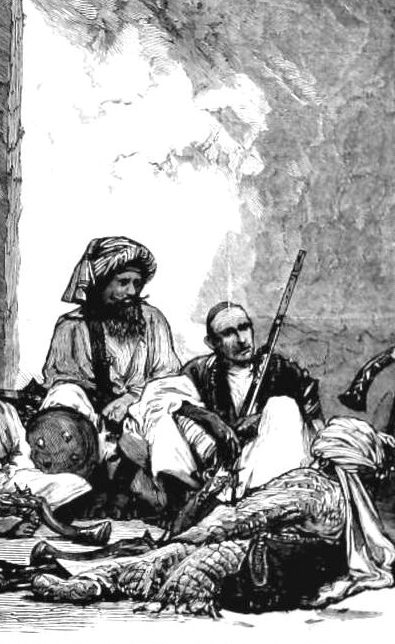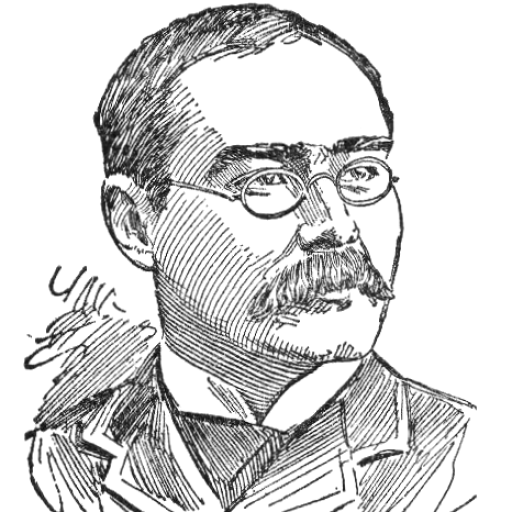Unsought counsel is cursed of God …

This is really two poems in one. The introduction (the first two stanzas) is a superb description of twilight atmosphere at the great caravan crossroads of Peshawar, which lies at the foot of the famous Khyber Pass – the gateway between the flatlands of the Indian subcontinent and the high plateau of Afghanistan. Kipling describes the caravan dinnertime with such loving detail that you can see, hear and even smell and taste it. But the second and main part of the ballad, the story of Wali Dad, is a scene from “the Great Game”.
It was Kipling, in his best-known novel ‘Kim’, who popularized the phrase “the Great Game” for the undercover operations of the British Raj in India, in particular the century-long struggle between the British Empire (the Redcoats) and the Russian Empire (the Graycoats) for control of Afghanistan. The Great Game was played by influence and ruse; espionage was an essential part of it. One of the most memorable characters of ‘Kim’ is the genial, expansive Mahbub Ali – horse trader, caravan owner, part-time British agent, and Kim’s mentor in the fine art of spying. ‘The Ballad of the King’s Jest’ treats us to another incident of the Great Game. Here, the same Mahbub Ali confirms one of his most important lessons – the wisdom of keeping one’s knowledge to oneself. This ballad is not a pretty story; but cruelty is part and parcel of life in Afghanistan, the largest remaining tribal society on earth, where life is cheap.
The Ballad of the King’s Jest
When spring-time flushes the desert grass, Our kafilas wind through the Khyber Pass. (1) Lean are the camels but fat the frails (2) Light are the purses but heavy the bales, (3) As the snowbound trade of the North comes down To the market-square of Peshawur town. In a turquoise twilight, crisp and chill, A kafila camped at the foot of the hill. Then blue smoke-haze of the cooking rose, And tent-peg answered to hammer-nose; And the picketed ponies, shag and wild, Strained at their ropes as the feed was piled; And the bubbling camels beside the load Sprawled for a furlong adown the road; And the Persian pussy-cats, brought for sale, Spat at the dogs from the camel-bale; And the tribesmen bellowed to hasten the food; And the camp-fires twinkled by Fort Jumrood (4) And there fled on the wings of the gathering dusk A savour of camels and carpets and musk, A murmur of voices, a reek of smoke, To tell us the trade of the Khyber woke. The lid of the flesh-pot chattered high, The knives were whetted and - then came I To Mahbub Ali, the muleteer, Patching his bridles and counting his gear, Crammed with the gossip of half a year. But Mahbub Ali the kindly said, "Better is speech when the belly is fed." So we plunged the hand to the mid-wrist deep In a cinnamon stew of the fat-tailed sheep, And he who never hath tasted the food, By Allah! he knoweth not bad from good. We cleansed our beards of the mutton-grease, We lay on the mats and were filled with peace, And the talk slid north, and the talk slid south, With the sliding puffs from the hookah-mouth. Four things greater than all things are, - Women and Horses and Power and War. (5) We spake of them all, but the last the most. For I sought a word of a Russian post, Of a shifty promise, an unsheathed sword, And a grey-coat guard on the Helmund ford. (6) Then Mahbub Ali lowered his eyes In the fashion of one who is weaving lies. Quoth he: "Of the Russians who can say? "When the night is gathering all is grey. "But we look that the gloom of the night shall die "In the morning flush of a blood-red sky. (7) "Friend of my heart, is it meet or wise "To warn a King of his enemies? "We know what Heaven or Hell may bring, "But no man knoweth the mind of the King. "That unsought counsel is cursed of God "Attesteth the story of Wali Dad. "His sire was leaky of tongue and pen, "His dam was a clucking Khattack hen; "And the colt bred close to the vice of each, "For he carried the curse of an unstaunched speech. "Therewith madness - so that he sought "The favour of kings at the Kabul Court; "And travelled, in hope of honour, far "To the line where the grey-coat squadrons are. "There have I journeyed too - but I "Saw naught, said naught, and - did not die! "He hearked to rumour, and snatched at the breath "of 'this one knoweth,' and 'that one saith,' - "Legends that ran from mouth to mouth "Of a grey-coat coming, and sack of the South. "These have I also heard - they pass "With each new spring and the winter grass. "Hot-foot southward, forgotten of God, "Back to the city ran Wali Dad, "Even to Kabul - in full durbar (8) "The King held talk with his Chief in War. "Into the press of the crowd he broke, "And what he had heard of the coming spoke. "Then Gholam Hyder, the Red Chief, smiled, "As a mother might on a babbling child; "But those who would laugh restrained their breath, "When the face of the King showed dark as death "Evil it is in full durbar "To cry to a ruler of gathering war! "Slowly he led to a peach-tree small, "That grew by a cleft of the city wall. "And he said to the boy: 'They shall praise thy zeal "`So long as the red spurt follows the steel. "`And the Russ is upon us even now? "`Great is thy prudence - wait them, thou. "`Watch from the tree. Thou art young and strong. "`Surely the vigil is not for long. "`The Russ is upon us, thy clamour ran? "`Surely an hour shall bring their van. "`Wait and watch. When the host is near, "`Shout aloud that my men may hear.' "Friend of my heart, is it meet or wise "To warn a King of his enemies? "A guard was set that he might not flee - "A score of bayonets ringed the tree. "The peach-bloom fell in showers of snow, "When he shook at his death as he looked below. "By the power of God, Who alone is great, "Till the seventh day he fought with his fate. "Then madness took him, and men declare "He mowed in the branches as ape and bear, "And last as a sloth, ere his body failed, "And he hung like a bat in the forks, and wailed, "And sleep the cord of his hands untied, "And he fell, and was caught on the points and died. "Heart of my heart, is it meet or wise "To warn a King of his enemies? "We know what Heaven or Hell may bring, "But no man knoweth the mind of the King. "Of the grey-coat coming who can say? "When the night is gathering all is grey. "Two things greater than all things are, "The first is Love, and the second War. "And since we know not how War may prove, "Heart of my heart, let us talk of Love!"
Notes
[1] ‘Kafilas’ – caravans
[2] ‘Frails’ – the women (fat from sitting indoors all winter).
[3] The merchants have spent all their cash buying goods for sale in Peshawar.
[4] ‘Fort Jumrood’ – nine miles west of Peshawar, at the Eastern end of the Khyber Pass.
[5] This was the favorite saying of Maharaja Ranjit Singh, “the Lion of the Punjab”, who from about 1800 to 1839 has single-handedly created the powerful Sikh state, which for a while challenged British expansion in India.
[6] If there were rumors that Russian patrols had reached the Helmand River, which runs through Central Afghanistan, the British had good reasons to be concerned.
[7] Mahbub Ali diplomatically states his allegiance to the British (the Redcoats) against the Russians (the Graycoats), while keeping his knowledge to himself.
[8] ‘Durbar’ – the assembly
